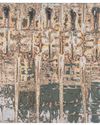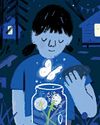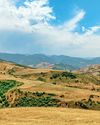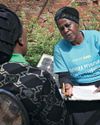
THE NOBEL PRIZE in Medicine, in 2021, was awarded to David Julius of the University of California, San Francisco and Ardem Pata-poution of Scripps Research Institute in La Jolla, California, for their discovery of receptors for temperature and touch. These were based on a food so ubiquitous it is difficult to imagine Indian cuisine without it. And yet, it hasn't been with us very long. Like the tomato, the potato, the sapota and chocolate, it was a gift from the Aztecs cultures and other Native American annihilated by Europeans. As they rampaged round the globe, marauding European hordes distributed their plunder of horticultural skill among other cultures. After the Portuguese had massacred Goa (1510), they consoled us with chilli. From 1510 to 2021, chilli has had a brilliant global career, crowned by the Nobel Prize. It is a suitable moment to reconsider this burning fruit of genocide.
The Nobel was awarded for an investigation centred on chilli's principal ingredient, capsaicin, which stings the tongue with unbearable heat. Today, the heat of chilli is culinary machismo. Chilli fresh green, dried red, powdered, or ground down to its essence-spikes every dish like a snarl of barbed wire. Why does chilli, and specifically capsaicin, burn?
In 1997, Julius discovered a receptor for capsaicin. Soon, he found that this receptor could be activated by heat as well-so this was a receptor that transmitted the message 'burn' to the brain.
Esta historia es de la edición March 2023 de Reader's Digest India.
Comience su prueba gratuita de Magzter GOLD de 7 días para acceder a miles de historias premium seleccionadas y a más de 9,000 revistas y periódicos.
Ya eres suscriptor ? Conectar
Esta historia es de la edición March 2023 de Reader's Digest India.
Comience su prueba gratuita de Magzter GOLD de 7 días para acceder a miles de historias premium seleccionadas y a más de 9,000 revistas y periódicos.
Ya eres suscriptor? Conectar

Demonstrators by Krishna Reddy
1968 Multicolour viscosity, Print on paper

Notes from Grief Camp
Every summer, more than a hundred children come together to spend a weekend swimming, climbing and canoeing. They also learn to deal with death

Six Places Cheese Lovers Should Visit
Ancient caves, monasteries, and other must-sees for fromage fans

THE LAND OF SUPERCEN TENARIANS
A remote region of Azerbaijan claims to have many extremely long-lived residents. What is their secret, or is it just a myth?

The Whistle Blowers
My grandparents had a distinctive way of communicating

"THE NEXT AIRCRAFT WILL CRASH ON LANDING"
THE JET WAS ALMOST OUT OF FUEL. THE PILOTS' ONLY OPTION WAS A MANOEUVRE NO ONE HAD EVER ATTEMPTED.

The Secrets in our Genes
Genomic sequencing tests can reveal much about your unique physiology. But are they worth it?

GOOD NEWS FROM AROUND THE WORLD
MENTAL HEALTH When her son was arrested last year, Tambudzai Tembo's mind went to dark thoughts of suicide.

Into the Inferno
A gas station owner has seconds to react when a car crashes into a gas pump

THE CLIMATE CHANGERS
THESE PLACES ARE LEADING THE WAY TO A FUTURE FREE OF FOSSIL FUELS